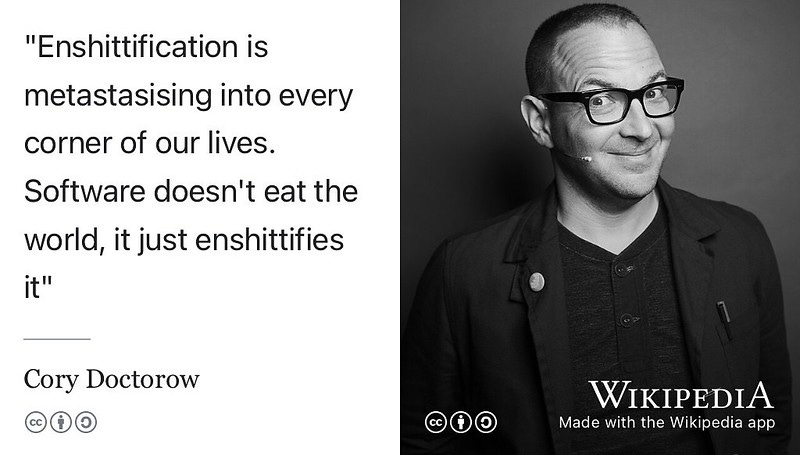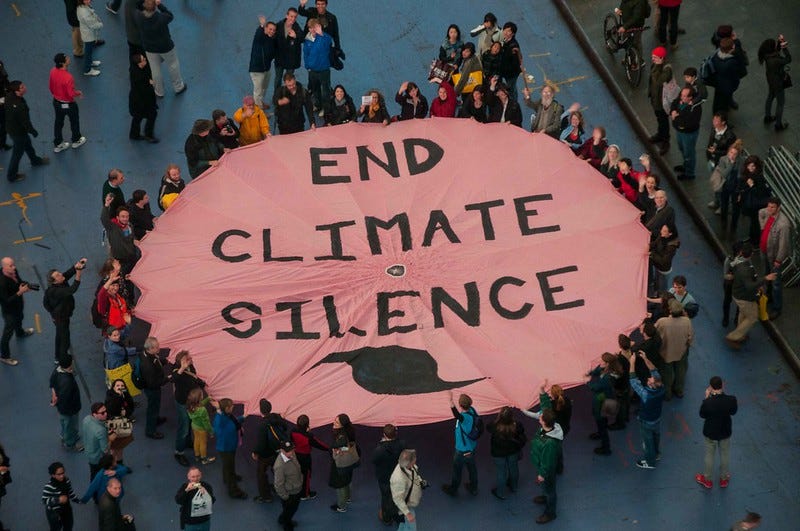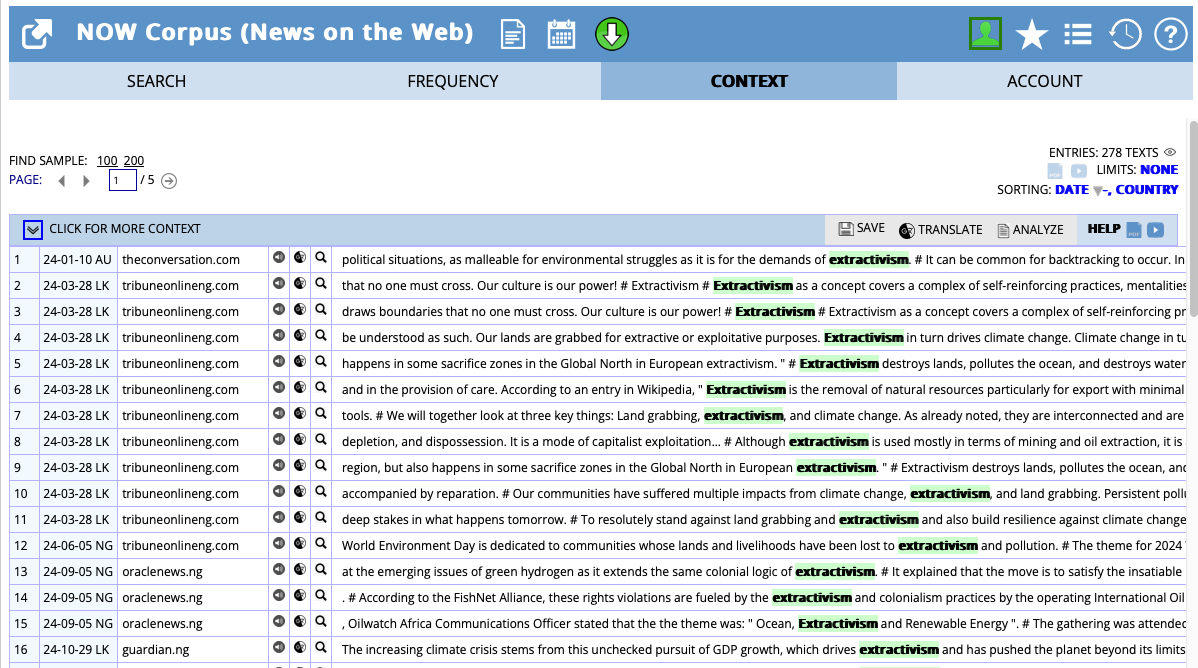Every year the big dictionary publishers run a ‘word of the year’. The Macquarie Dictionary, for example, gets its editors to put together a long list, and a select committee whittles that down to the short list. The dictionary publishes the short list, which allows the public to vote for their choice.
This year’s committee nominated the word ‘enshittification’. The word is defined by this dictionary as:
noun Colloquial the gradual deterioration of a service or product brought about by a reduction in the quality of service provided, especially of an online platform, and as a consequence of profit-seeking.
The committee supplied their commendation:
A very basic Anglo-Saxon term wrapped in affixes which elevate it to being almost formal; almost respectable. This word captures what many of us feel is happening to the world and to so many aspects of our lives at the moment.
In only the third time in the nearly 20 years of this award, the ‘people’ choose the same exact word as the Macquarie dictionary committee. I don’t what to spoil the Macquarie dictionary party, the American Dialect Society got there first, with its nomination of ‘enshittification’ as their 2023 word of the year.
‘Enshittification’ is cute - and like the committee I love its ‘morphology’, that is, its use of the ‘en-’ prefix, and the piling on of two further suffixes: ‘-ify’, as in ‘enshittify’ creating a new verb, before then adding the '-ation’ suffix to create an abstract noun. But it wouldn’t get my vote.
Other well known dictionaries did much the same thing: opt for pop culture terms, with, IMHO, not much consequence. The Oxford English Dictionary went with ‘brain rot’ - a nod to what social media and big tech companies are doing to us. Their metric was not about its newness, but its huge increase in frequency - between 2023 and 2024 the term jumped up 250%.
The Cambridge Dictionary chose ‘manifest’, because it was one of the most looked up terms in their dictionary over the year. This is another old word being made new, now meaning:
to use methods such as visualization and affirmation to help you imagine achieving something you want, in the belief that doing so will make it more likely to happen
The increase in attention to this word, say the Cambridge Dictionary team, is coming from the growth of ‘manifest influencers’ - enough that the dictionary added this meaning to their book in 2023. The Collins dictionary chose (yawn) ‘brat’. The Miriam Webster dictionary also based their shortlist on ‘search volume’ (how many times the words were searched in their dictionary during the year). Their 2024 WOTY was a bit edgier: ‘polarization’. The increased frequency of look ups of this word, they wrote:
reflected the desire of Americans to better understand the complex state of affairs in our country and around the world.
Now that speaks to me. Here’s their shortlist, which includes a new word that I love. It’s ‘allision’, explained as follows:
Baltimore’s Francis Scott Key Bridge collapsed in March when the container ship Dali ran into it, causing the death of six construction workers, the destruction of a portion of Interstate 695, and a months-long halt to port operations. News sources referred to the event as a collision but maritime publications mostly used allision instead.
A ‘collision’ needs two moving objects. ‘Allision’ is when a moving thing crashes into a stationary thing. In maritime world, they make a crucial distinction between ‘collisions’ and ‘allisions’.
Annabelle’s Climate Word of the Year (CWOTY)
I was disappointed that climate did not turn up in any of the WOTY lists I looked at this year. Apart from ‘enshittification’, which was chosen strictly on new-ness and fun-ness grounds, not on frequency, the other words got their awards by being highly popular. With the ongoing epidemic of climate silence, it is hard to get climate words noticed - not enough people, including media, talking or writing about climate.
I am constantly listening to language. I am constantly analysing what people say and write around me to understand both what they are communicating, and what their words might mean for our language and our ideologies. The climate space is big and dynamic - and we need more words for explaining what is happening, what is coming, and what people are feeling.
So when I read this note from one of my favourite climate writers, Chloé Salmon, who writes Our New Climate, I heard something new: ‘extractivism’.
As I read this note, I was like: ‘hold on there … hmmm … interesting, very very interesting’. Of course, once I heard this word, in the following weeks, I kept running into it, and wondered how I’d missed it.
I love the whole vibe of Chloé’s note, which is a beautiful take on a crucial linguistic concept from one of my favourite dead white male linguists, Benjamin Lee Whorf. I don’t know if Chloé has read his collection of posthumously published essays, called Language Thought and Reality, but it feels like she has.
Whorf coined the concept of ‘crypotypes’ to talk about the meanings that language makes which are ‘submerged, subtle and elusive’. While Whorf focussed on cryptotyes in grammatical categories - for example, why we say ‘uncover, undress, unlock’ but not ‘unbreak, undry, unheat’ - the general point is that language makes covert meanings that you can elucidate only by careful analysis and attention.
Terms like ‘ecosystem services’, ‘carbon budget’, ‘natural capital’, rest on a whole lot of unsaid assumptions and humans’ relationships with nature. This is the point in Chloé’s note - that when you say any of these words, you are unconsciously affirming deep and problematic ideologies, including a host of meanings that can now be captured by the term ‘extractivism’. This is why a word can have a vague feeling (‘green’), but if you listen carefully you can hear it ‘scream’ something else (‘extractism’).
‘Extractivism’: a little history
While ‘extract’ and ‘-ism’ have been around for a while, their conjunction is new. The word is not yet listed in the Oxford English Dictionary or the Macquarie Dictionary. It has a Wikipedia entry, and through a quick look at the talk page I dated this to 2017. It turns up in the big news corpus I often look in, as the screenshot below shows. The numbers are small, so it’s profile is low.
The origins of the term, from what I have read, are in Latin America, specifically Brazil, and the context for its coinage is understanding why countries with a lot of ‘natural resources’ have a large majority of its people in poverty. And the short answer to that question is ‘colonialism’ - to these territories being a harvesting ground for empires who take unprocessed ‘natural resources’ for their own wealth creation.
Reading this article by Professor of Economic History and Institutions, Rafael Domínguez Martín published in 2021, the term’s coinage was helped along by the research of the American sociologist, Stephen E Bunker, and his work on extractivist capitalism and globalization, for example in this book published in 1988.
According to Martín’s article, the word ‘extractivism’ is coined by the Uruguayan biologist Eduardo Gudynas in 2009 to mean a particular type of extraction of natural resources in high volume or intensity where 50% or more is destined for export as primary materials without any form of processing. The term then intersects with Latin American eco-Marxism to take on a deeper connection to colonialist dispossession and appropriation. In fact Martín’ uses a plural version of this term - ‘extractivisms’ - to indicate some differences in usages. All forms of extractivisms, he argues, are predatory.
Gudynas also adds another neologism into this heady mix: the term ‘extrahección’, for which I could find no English translation. The word captures the idea of extractivism through violence and the violation of human rights.
Choé’s post urges us to do some deeper thinking about a number of apparently neutral and inoffensive terms because they hide their deeper, insidious assumptions. There’s more to say on all of this, but it’s nearly Christmas, and today (Saturday) as I’m writing is my birthday, and so I gotta go.
I’m so grateful to my subscribers and anyone else who has read my work at this Substrack since I launched in April this year. See you in 2025: I’m having a bit of break, and you will receive the next post from #Changing Language in the Climate Crisis at 9am (AEDT) on Monday February 3rd.










This was a wonderful, wonderful read. Almost fell out of my seat when I read my name! I loved the historical linguistics detour on the word ‘extractivism’ too. Thank you for the share, and happy belated birthday Annabelle!
Thanks Annie!!